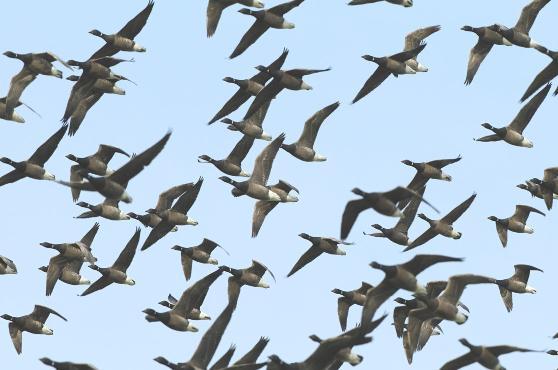
3 minute read
RSPBPagham Medmerry
By Rob Yarham, RSPB Pagham & Medmerry
The days are getting much shorter now, and it’s time to get ready for Christmas. You’ve been busy sending cards, finding presents, sorting out the festive menus and looking forward to seeing friends and family. And you’ve even started the advent calendar! But Father Christmas isn’t the only visitor from the far north to drop by this time of year. If you intend to enjoy a fresh winter walk at RSPB Pagham Harbour and Medmerry reserves this month, you won’t see a reindeer (roe deer, maybe) or hear sleigh bells, but you will experience the wonderful sights and sounds of our wintering waders and wildfowl – the many water birds, ducks and geese that have flown thousands of miles from the Arctic to spend the season with us. But why have they come all that way? Well, it might seem a bit chilly to you and me, but compared to the conditions in the Arctic, it seems positively Mediterranean to these visitors from the cold and, at this time of year, the continuous darkness of the polar north. And our reserves are packed with lots of the special types of food these birds like to eat. So what might you find at our RSPB reserves over Christmas and the New Year? Let’s start with two of the wader species you’re most likely to see. Black-tailed godwits are large wading birds, rather plain grey above and pale below at this time of year, with long legs and long, straight bills, which they use to fish in the pools of water and mud for invertebrates, including worms and snails. Although we do have some black-tailed godwits which breed in the UK, they fly south to Africa for the winter; the black-tailed godwits you see here now will have come from the land of ice and fire – Iceland! At the other end of the wader scale are the dunlin. These common, small waders are about the size of starlings and are short and round, with brown-grey backs and pale bellies, and short, slightly down-curved bills. You’ll see them flying or running around in large flocks, digging their little beaks in the mud, looking for molluscs, worms and small crustaceans. Our winter -visiting dunlins will have flown all the way here from Scandinavia and Russia. Then we have the many ducks and geese species which come to stay through the winter. RSPB Pagham Harbour and Medmerry reserves are nationally important sanctuaries for these birds at this time of year. The wildfowl are also drawn to our food-rich wet fields, saltmarshes and muddy harbours and estuaries. The ducks inWintering flocks of brent geese credit: Andy Hay clude wigeon, teal and a nationally important number of the rather smart-looking northern pintail duck. I often think that the sound of hundreds of ducks whistling at dusk on the marshes is one of the most atmospheric sounds of the winter. It’s worth staying out and braving the colder, darker winter evenings to hear them! Finally, this month is a great time to look for the brent geese for which our reserves are famous at this time of year. Our smallest goose – about the size of a mallard duck – they nest on the boggy tundra in the Arctic during the very short summer in the far north, and begin to arrive on our coasts in large flocks from early October onwards. In the UK, we mostly see two forms of Brent geese. Pale-bellied Brent geese nest in Svalbard and Greenland and mostly spend the winter in northeastern England and in Ireland. While in East Anglia and here on the south coast, we see flocks of dark-bellied brent geese, which nest in eastern Siberia and fly about 3,000 miles each year to spend the winter with us. When here, they divide their time between feeding on eelgrass in estuaries and the Solent at low tide and feeding, and roosting in the coastal fields at high tide. Look up to see flocks of these small, dark geese fly out to see and back again, calling softly to each other. Merry Christmas and a Happy New Year from the team at RSPB Pagham Harbour! Join us on one of our guided walks this month to learn all about our wonderful wintering waders and wildfowl! Find out more by visiting our website or call 01243 641508. www.rspb.org.uk/paghamharbour
Advertisement










